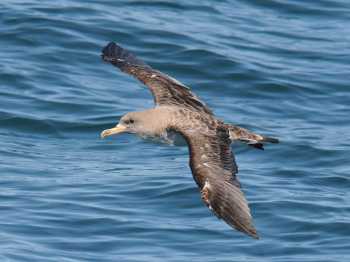Paulo Catry (Eco-Ethology Research Unit, ISPA, Lisbon, Portugal) and colleagues, writing in the journal Ecology have experimentally manipulated breeding Cory's Shearwaters Calonectris borealis with a view to learn more about their migration patterns.
The paper’s abstract follows:
“Carry-over effects relate to events or processes that influence individual performance in a subsequent season, but their occurrence in the annual cycle of migratory avian taxa is seldom studied. We investigated if different levels of resource allocation to reproduction may result in carry-over effects that change the timing and destination of long-distance migration. We reduced the parental investment of Cory's shearwaters Calonectris diomedea by removing their chick at an early stage. When compared to individuals with greater parental investment (controls which raised chicks to close to fledging), manipulated birds started most stages of migration sooner, and returned to the colony earlier at the start of the following breeding season. Late arrival in the subsequent nesting season increased the probability of skipping a breeding year. Manipulated males were less likely to engage in long-distance migration, which supports the idea that partial migration is condition dependent. Our study demonstrates experimentally that energetic or time-dependent costs of reproduction may have an enduring impact on migration schedule and on non-breeding geographical distribution of long-distance migrants, which may also influence the ability to breed in the following season.”

Cory's Shearwater in South African waters
Photograph by John Graham
Reference:
Catry, P., Dias, M.P., Phillips, R.A. & Granadeiro, J. 2013. Carry-over effects from breeding modulate the annual cycle of a long-distance migrant. an experimental demonstration. Ecology. doi.org/10.1890/12-2177.1.
John Cooper, ACAP Information Officer, 10 March 2013

 English
English  Français
Français  Español
Español